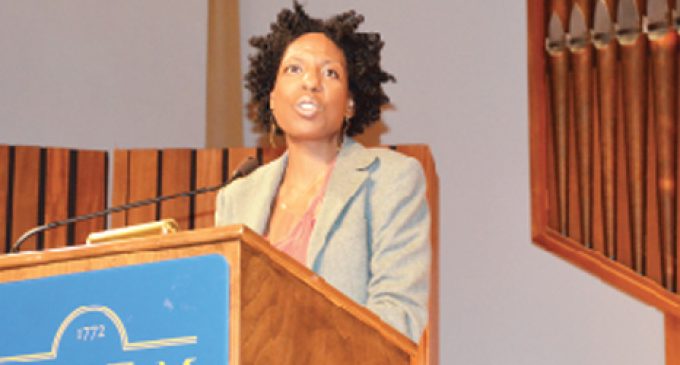‘Hattie’ author shares her story at Salem

Ayana Mathis discussed her novel “The 12 Tribes of Hattie” on Sept. 17 at Salem College.
The book, the Philadelphia native’s debut novel, jolted to the top of bestsellers’ lists after Oprah Winfrey selected it for her Oprah’s Book Club 2.0.
“Reviews of the novel have been nothing short of laudatory,” Salem’s Dr. Jo Dulan said as she introduced Mathis.
“The New York Times compares her to Toni Morrison … but I would say her writing style is all her own. It’s unique, it’s fresh, it’s unlike much of what we read.”
The novel tells the story of Georgia-born Hattie Shepherd and her “12 tribes” – 11 children and one grandchild whose distinct story lines populate the narrative.
Oprah Winfrey found the novel so compelling that upon completing it, she called Mathis, who was vacationing in Paris, France at the time.
“This book was so astonishing, it left me speechless,” Winfrey wrote in the January 2013 edition of her O Magazine. “…The book’s ending is the most perfect ever. I was silenced by it. When I finished it, I had to be still for a moment.”
Mathis, who resides in Brooklyn, NY, said that hearing from the world’s top media mogul was a surreal moment for her.
“It was exciting, stunning – very shocking,” she said of receiving the call. “Unforgettable.”
Mathis, who addressed a packed house at Salem’s Shirley Recital Hall on Sept. 17, said “The 12 Tribes of Hattie” is an allusion to the biblical 12 tribes of Israel. Much of the book is set during the pivotal Great Migration, where millions of African Americans flocked to the North in search of a better life. Like the 12 tribes of Israel, the characters in Mathis’ novel found that The Promised Land isn’t always what it’s purported to be.
“The (biblical) Promised Land turns out to be not what they expected at all. It was incredibly fraught with difficulty, and to this day continues to be,” she noted. “That makes me wonder what it’s like to move away from a situation of bondage into a situation of freedom, especially when that freedom is not what you expected it to be. It seemed to speak directly to the question of how people ‘bear up’ and how people survive.”
Mathis’ own family was a part of the Great Migration, and she said in retrospect, the novel served as fictional exploration of the estranged family she never knew.
“The book I think is an attempt to understand I think my own origins. I come from a family that is rather large but is also very fractured; there was a split in my family when I was very young,” she revealed. “…I was writing out my obsessions about a family that I didn’t know very well but whom I was desperate to try to imagine.”
Mathis said people often ask her where the book originates from, but the beauty of it – and the beauty of all fiction in her mind – is that it isn’t derived from any specific person or event, but borne of an imagination that has been formed by many different experiences.
“One of the things that I think fiction does is that it’s an enormous triumph of imagination … and of a kind of radical empathy,” she said. “…Fiction’s ability to make us bigger, to make use broader, that, I think is fiction’s greatest triumph.”
Mathis, a New York University alumna, has held a variety of occupations, including stints as a waitress and even a fact checker for a magazine. Although she had been writing since she was a child, her writing career didn’t begin in earnest until she enrolled in the prestigious two-year residency at the University of Iowa at the age of 36.
Salem College freshmen Shanae Heath and Leniece Linder said attending the forum gave them greater perspective on and insight into the book, and the history behind it.
“After hearing about the Great Migration, it made more sense how she wrote the book and how they relied on each other to survive,” Heath, a Charlotte native and exercise science major, said of Mathis’ characters.
Linder, a communications and political science major, said the historical context of the book hit home for her because her own family relocated to Philadelphia during the Great Migration.
“I knew it from a theoretical sense of ‘they got up and left,’ but I never thought about what it did to the people; I never looked at it from an emotional context,” she said. “…It was a hard read, but it was enriching. I felt like I learned a lot.”
Mathis’ talk was followed by a reception and book signing in the lobby of the school’s Elberson Fine Arts Center.














